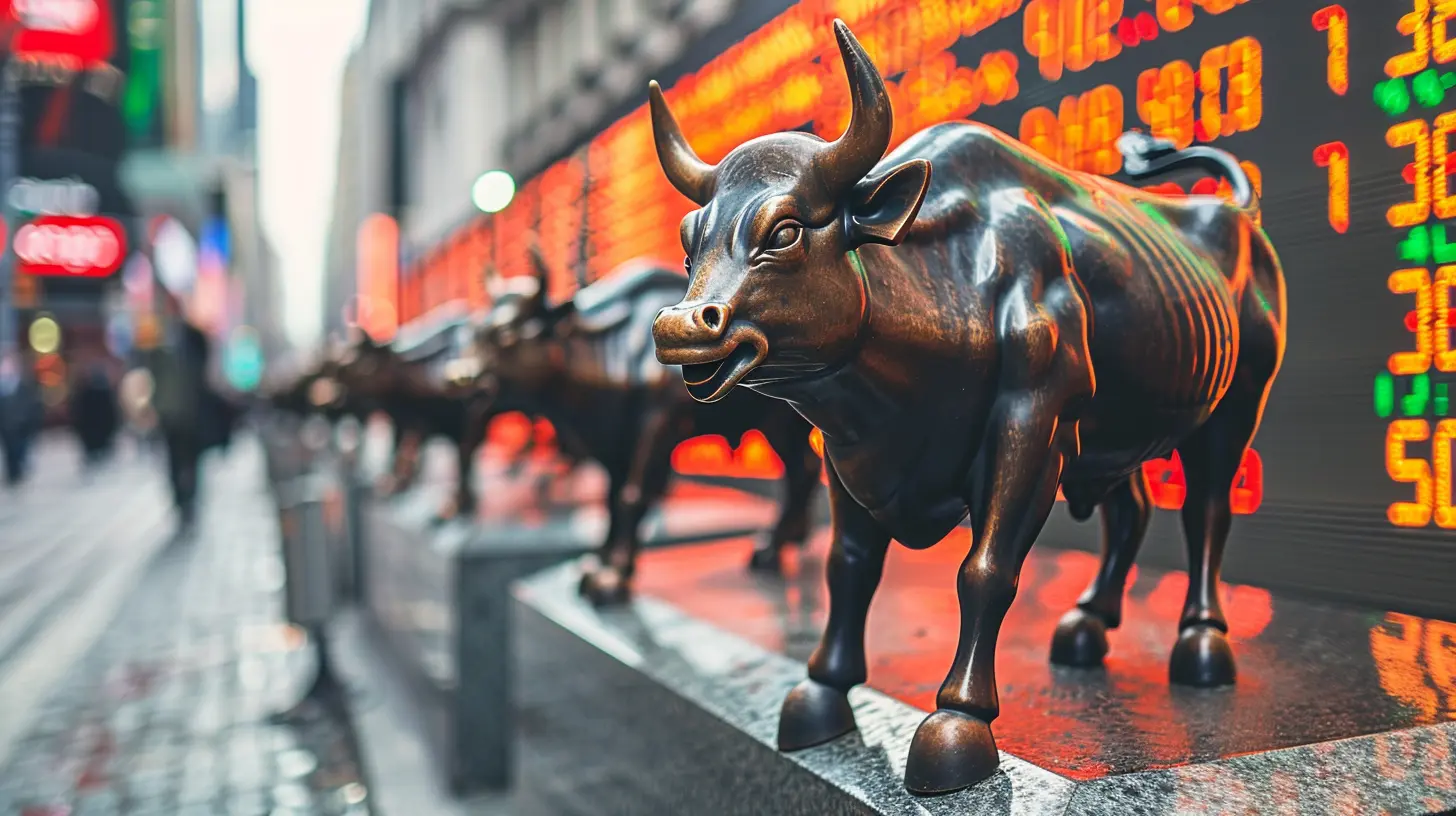How Company Mergers and Acquisitions Affect Stock Prices
15 February 2025
Have you ever wondered what makes stock prices swing wildly when a merger or acquisition (M&A) announcement is made? It's like the stock market suddenly becomes a drama-filled soap opera. Investors panic, rejoice, speculate, and sometimes just scratch their heads, wondering, “What just happened?” Well, sit tight because we're going to break this down in plain English. By the end of this, you'll have a solid understanding of how company mergers and acquisitions impact stock prices. Ready? Let’s dive in! 
What Are Mergers and Acquisitions (M&A)?
First things first—what do mergers and acquisitions even mean? Let’s define this quickly for context.- Mergers: This happens when two companies combine to form one new, larger company. Think of it like a marriage where two entities join forces and operate as one.
- Acquisitions: This is when one company takes over another. In this case, the acquiring company essentially "buys out" the target company.
Simple enough, right? Now, let’s get into why a simple "business marriage" or "business buyout" can send stock prices into a frenzy. 
Stock Prices: A Tug-of-War of Emotions and Expectations
To understand stock price behavior during M&A, it’s essential to know that stock prices are often driven by investor emotions, expectations, and market speculation. Think of the stock market like a crowd watching a magic trick—some people cheer, some boo, and others are just confused. This emotional roller coaster plays a massive role in how share prices react.When M&A news hits the market, it’s not just about the companies involved. Investors start analyzing profits, growth potential, synergies, and yes—whether the “magic trick” will pay off or flop. Let’s explore how M&As typically affect stocks. 
How Mergers and Acquisitions Affect the Acquiring Company’s Stock
1. Short-Term Wobbles: Uncertainty Breeds Volatility
Here’s the thing: investors aren’t all-seeing fortune tellers. The moment an acquisition is announced, stock prices of the acquiring company often fall. Why? Because uncertainty takes over.Think of it like buying a fixer-upper house. Sure, it might have tons of potential, but investors worry about:
- The cost: Will the acquiring company overpay?
- Integration risks: Can two different corporate cultures successfully work together?
- Debt concerns: Did the acquirer take on too much debt to fund the deal?
Investors often want proof that the deal will actually benefit the acquiring company. Until then, the stock might take a hit.
2. Long-Term Gains: If the Deal’s a Success
If the acquisition is successful, the acquiring company’s stock can soar in the long run. For example, if the merger results in higher profits, cost savings (synergies), or increased market share, investors will likely jump back in. Patience pays off in such cases.
How Mergers and Acquisitions Affect the Target Company’s Stock
1. Instant Gains: The Golden Ticket
For the target company, being acquired is often like hitting the lottery. Why? Because the acquiring company typically offers a premium—that’s a fancy word for “extra cash” above the current stock price—to sweeten the deal for the shareholders.For example, if the target company’s stock was trading at $10 per share before the M&A news, the acquiring company might offer $12 per share to entice shareholders to sell. This premium causes the target’s stock price to skyrocket almost immediately after the announcement.
2. Uncertainty in Some Cases
However, it’s not always rosy for the target company. If there are rumors the acquisition might fall through or if regulatory hurdles pop up, the stock price could drop. Investors hate uncertainty as much as they love returns, so any obstacles in the deal process can cause temporary dips.The Role of Market Sentiment: A Snowball Effect
Here’s the kicker: even one person sneezing in the stock market can cause a chain reaction (metaphorically speaking, of course). In M&A situations, market sentiment can snowball.- If investors are optimistic, stock prices might rise beyond anyone’s expectations because everyone’s piling in, hoping to ride the wave.
- If investors are pessimistic, fear can drive prices down further than they should fall.
It’s all about perception. A company could announce the biggest merger of the decade, but if the market doesn’t “buy into” the vision, stock prices might still tank.
The "Synergy" Buzzword: Does It Always Pay Off?
Have you ever heard executives throw around the word “synergy” when discussing mergers? It’s one of those Wall Street buzzwords that sounds fancy but simply means that “two companies working together will accomplish more than they could on their own.”While synergies can lead to cost reductions and revenue growth, they’re not always guaranteed. When synergies fail, M&As can actually destroy shareholder value. That’s why some investors remain skeptical until they see hard evidence of success.
Real-Life Examples: The Good, The Bad, and The Ugly
The Good: Disney Acquiring Pixar
Remember when Disney acquired Pixar? That was a blockbuster move! Investors loved the deal because it made strategic sense and produced real value. Disney’s stock soared over time as the movies churned out billion-dollar revenues.The Bad: AOL and Time Warner
On the flip side, there’s the infamous AOL-Time Warner merger. It’s often called one of the worst in history. The synergies never materialized, and both companies lost billions in value. Investors fled, stock prices plummeted, and it’s now a cautionary tale in the M&A world.The Ugly: Amazon and Whole Foods
When Amazon acquired Whole Foods, there was both praise and criticism. Whole Foods’ stock surged on the news, but Amazon didn’t see immediate stock gains. Over time, though, Amazon proved this acquisition was a strategic win as they capitalized on the grocery market.Other Factors That Impact Stock Prices During M&A
You might be wondering: “Isn’t there more to this stock price thing?” You bet! Let’s list out a few additional factors that can influence the outcome:- Regulatory Approvals: Governments often look at antitrust laws to determine if the merger could hurt competition. If regulators block the deal, stock prices could tumble.
- Timing of the M&A: If the market is in a bearish (downward) cycle, even a good M&A might not immediately reflect in stock prices.
- Macroeconomic Conditions: Interest rates, inflation, and overall economic health can sway how investors react to M&A news.
Key Takeaways
1. For the acquiring company, stock prices might initially fall due to uncertainty but could recover in the long term if the deal proves successful.2. For the target company, stock prices typically rise due to a premium offered by the acquirer.
3. Market sentiment, regulatory approvals, and synergy expectations play a massive role in stock price fluctuations during M&A.
4. Not all mergers are created equal—some succeed spectacularly, while others end in disaster.
Final Thoughts
Mergers and acquisitions are exciting events in the business world. They can create immense value or turn into cautionary tales. For investors, understanding the domino effect of M&A on stock prices is crucial for making informed decisions.Next time you hear about a company merger or acquisition, you’ll know exactly how to interpret the market's reaction. Is it always rational? Nope. But that’s part of the fun, isn’t it?
all images in this post were generated using AI tools
Category:
Stock MarketAuthor:

Harlan Wallace
Discussion
rate this article
16 comments
Soleil Hughes
Mergers boost value; ignore volatility, focus on long-term gains.
April 6, 2025 at 1:00 PM

Harlan Wallace
While mergers can enhance long-term value, it’s essential to consider market volatility and short-term impacts on stock prices. Balancing both perspectives provides a clearer picture of their overall effect.
Blaze Hodge
This article effectively highlights the complexities of mergers and acquisitions, illustrating how market sentiment can overshadow fundamentals, ultimately leading to volatile stock price reactions post-announcement. Insightful read!
April 4, 2025 at 8:03 PM

Harlan Wallace
Thank you for your thoughtful comment! I'm glad you found the insights on market sentiment and stock price volatility valuable.
Esme McCarron
This article provides a concise overview of how mergers and acquisitions can significantly impact stock prices, highlighting both immediate market reactions and long-term investor sentiment. A must-read!
April 2, 2025 at 3:23 AM

Harlan Wallace
Thank you for your thoughtful comment! I'm glad you found the article helpful in understanding the impact of mergers and acquisitions on stock prices.
Thor Oliver
Mergers and acquisitions are powerful catalysts in the financial world, reshaping markets and driving stock prices. Understanding their dynamics can unlock investment potential and reveal hidden opportunities. Embrace the challenges and insights of M&A—they’re the keys to navigating the evolving landscape of finance!
March 30, 2025 at 4:30 AM

Harlan Wallace
Thank you for your insightful comment! M&A indeed play a crucial role in shaping market dynamics and presenting unique investment opportunities. Understanding these processes is essential for navigating the financial landscape.
Zinna Roberson
Great insights! Understanding the dynamics of mergers and acquisitions is crucial for investors. Your analysis highlights the potential opportunities and risks, empowering readers to make informed decisions in the ever-changing market landscape. Well done!
March 12, 2025 at 1:04 PM

Harlan Wallace
Thank you for your kind words! I'm glad you found the insights valuable for navigating the complexities of mergers and acquisitions.
Garrett Simon
Mergers fuel volatility; expect chaos!
March 6, 2025 at 3:26 AM

Harlan Wallace
Thank you for your insight! Mergers can indeed introduce volatility as markets react to changes, but they can also create opportunities for growth and stability in the long run.
James Gomez
Great insights! Mergers and acquisitions can be a wild ride for stock prices; it’s fascinating to see how they reshape markets!
February 28, 2025 at 3:40 AM

Harlan Wallace
Thank you! Indeed, the dynamics of mergers and acquisitions can significantly influence stock prices and market landscapes.
Azurael McQuiston
Great insights on how mergers and acquisitions influence stock prices! Your clear explanations make complex concepts accessible. Looking forward to more informative articles like this!
February 26, 2025 at 12:57 PM

Harlan Wallace
Thank you so much for your kind words! I'm glad you found the article insightful, and I appreciate your support. Stay tuned for more!
Selah Adkins
Do synergies always boost stocks?
February 24, 2025 at 8:50 PM

Harlan Wallace
Not always. While synergies can lead to increased efficiency and revenue, market perceptions, integration challenges, and overestimated benefits can also negatively impact stock prices.
Brittany Ramos
Double the companies, double the fun!
February 24, 2025 at 5:17 AM

Harlan Wallace
Absolutely! Mergers can create exciting opportunities, but they also come with risks that impact stock prices.
Cody Wells
Just like my love life: mergers excite, acquisitions confuse, and stocks fluctuate!
February 22, 2025 at 8:05 PM

Harlan Wallace
That’s a clever analogy! Just like in love, the dynamics of mergers and acquisitions can lead to unpredictable outcomes for investors.
Lanae McAdoo
Mergers and acquisitions can create volatility, reflecting investor sentiment and future growth expectations.
February 20, 2025 at 1:25 PM

Harlan Wallace
Absolutely, mergers and acquisitions often lead to fluctuating stock prices as investors reassess company value and growth potential amidst changing market dynamics.
Axel McMahon
This article effectively highlights the intricate relationship between mergers and acquisitions (M&A) and stock prices. It emphasizes how market sentiment, potential synergies, and strategic alignment can drive valuation changes. Understanding these dynamics is crucial for investors looking to navigate the complexities of M&A activity in financial markets.
February 16, 2025 at 7:34 PM

Harlan Wallace
Thank you for your insightful comment! I'm glad you found the article helpful in understanding the complexities of M&A and their impact on stock prices.
Cruz McLaurin
This article effectively highlights the complex dynamics between mergers and acquisitions and stock prices. It’s crucial for investors to understand market sentiment and valuation shifts during these corporate transitions.
February 16, 2025 at 4:49 AM

Harlan Wallace
Thank you for your insightful comment! Understanding market sentiment and valuation during mergers and acquisitions is indeed vital for investors navigating these complex dynamics.
Arwenia Ward
Mergers and acquisitions are pivotal moments in corporate strategy that can redefine market landscapes. They create opportunities for growth, innovation, and shareholder value. Investors should embrace the volatility, for within it lies the potential for significant returns. Adapt, analyze, and seize the moment!
February 15, 2025 at 9:20 PM

Harlan Wallace
Thank you for your insightful comment! Mergers and acquisitions indeed play a crucial role in shaping market dynamics and can lead to substantial opportunities for investors. Embracing this volatility is key to capitalizing on potential returns.
Susan McGinnis
Mergers and acquisitions: where companies play a high-stakes game of musical chairs! Just remember, when the music stops, some stocks might dance to the top while others take a tumble. Keep your portfolios nimble and your popcorn ready! 🍿📈
February 15, 2025 at 4:16 AM

Harlan Wallace
Great analogy! Mergers and acquisitions can indeed lead to significant stock price fluctuations. Staying agile in your investments is key!
MORE POSTS

Roth IRA Conversions: When Does It Make Sense?

The Role of Employer-Sponsored Pension Plans in Retirement Planning

The Passive Income Path to Financial Independence

Should You Cancel Your Credit Card? Pros and Cons Explained

Strategies for Deferring Capital Gains Taxes

How to Diversify a Stock Portfolio for Market Stability

Inflation’s Role in Supply Chain Disruptions: A Guide for Investors

Financial Freedom Through Real Estate: What You Need to Know

How to Track Your Tax Refund: Tools and Tips

Market Bubbles: When to Hold and When to Fold